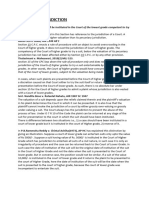Professional Documents
Culture Documents
Urisdiction of Foreign Courts: Territorial or Local Jurisdiction
Urisdiction of Foreign Courts: Territorial or Local Jurisdiction
Uploaded by
Amit RajOriginal Description:
Original Title
Copyright
Available Formats
Share this document
Did you find this document useful?
Is this content inappropriate?
Report this DocumentCopyright:
Available Formats
Urisdiction of Foreign Courts: Territorial or Local Jurisdiction
Urisdiction of Foreign Courts: Territorial or Local Jurisdiction
Uploaded by
Amit RajCopyright:
Available Formats
urisdiction of foreign courts
A foreign court is described as a court outside India and not authorised or
continued by the authority of the Central Government, and a foreign
judgement means a judgement of a foreign court. In other words, a foreign
judgement means an adjudication by a foreign court upon a matter before it.
The following conditions would give power to the foreign courts to adjudicate
a matter presented before it:
1. When the person is a subject of a foreign country in which the
judgement has been obtained.
2. If he was a resident of a foreign country when the action was
commenced and the summons was served on him.
3. When the person is in the character of plaintiff chooses the foreign
court as the forum for taking action in which forum he issued later.
4. When the party on summons voluntarily appeared.
5. When through an agreement, a person has agreed to present
himself to the forum in which the judgement is obtained.
Kinds of jurisdiction
Territorial or local jurisdiction
Under this territorial or local jurisdiction, the geographical limits of a court’s
authority are clearly delineated and specified. It cannot exercise authority
beyond that geographical/ territorial limit. For example, if a certain crime is
committed in Madhya Pradesh, only the courts of law within the borders of
Madhya Pradesh can hear and decide the case. Furthermore, Section 16 of
the Code of Civil Procedure explains the territorial jurisdiction on the grounds
of the location of the immovable property. In the case of Harshad Chiman Lal
Modi Vs D.L.F Universal Ltd , the court interpreted Section 16 that the suit
pertaining to immovable property should be brought to the court. The court
does not have the power to decide the rights of property which are not
situated. However, the court can still pass a relief if the opposite party
agrees to try the suit in such a case.
Pecuniary jurisdiction
Pecuniary means ‘related to capital.’ It approaches the question of whether
the court is competent to try the case of the financial value. The code allows
analysing the case unless the suit’s value exceeds the financial limit of the
court. Section 15 of the Code of Civil Procedure commands the organisation
of the suit in the court of the low grade. It refers to pecuniary jurisdiction of
Civil court. It is a course of the method and it does not affect the jurisdiction
of the court. The main objective of establishing pecuniary jurisdiction is to
prevent the court of a higher level from getting burdened and to provide
assistance to the parties. However, the court shall interfere if it finds the
judgment to be wrong. For example, ’A ’wants to accuse ‘B’ due to a violation
of the contract to obtain Rs 5000 in Bombay. The Bombay High Court has
original jurisdiction and small causes court with the jurisdiction up to Rs
50000. So, a suit to obtain Rs 5000 should ideally be dealt with small causes
court. In the case of Karan Singh Vs Chaman Paswan the plaintiff filed a suit
in the subordinate court involving an amount of Rs 2950, but the court
rejected the case. Later his next appeal was allowed by the High Court, but it
ordered him to pay the deficit amount. The appellant contested that the
decision of the district court will be a nullity, but the High Court dismissed
the claim. Later the Supreme Court confirmed the decision of the High Court
declaring that the decision of district court won’t be void.
You might also like
- The Book of Writs - With Sample Writs of Quo Warranto, Habeas Corpus, Mandamus, Certiorari, and ProhibitionFrom EverandThe Book of Writs - With Sample Writs of Quo Warranto, Habeas Corpus, Mandamus, Certiorari, and ProhibitionRating: 5 out of 5 stars5/5 (10)
- Civil Procedure in TanzaniaDocument190 pagesCivil Procedure in Tanzaniajuma kulaba100% (1)
- Place of Suing CPCDocument6 pagesPlace of Suing CPCAshok Kumar100% (1)
- March 7Document5 pagesMarch 7HuehuehueNo ratings yet
- Simple Guide for Drafting of Civil Suits in IndiaFrom EverandSimple Guide for Drafting of Civil Suits in IndiaRating: 4.5 out of 5 stars4.5/5 (4)
- Laurel Vs MisaDocument5 pagesLaurel Vs MisaAj Guadalupe de MataNo ratings yet
- Kinds of jurisdictionDocument4 pagesKinds of jurisdictionAleena Anna SabuNo ratings yet
- CPC AssignmentDocument9 pagesCPC AssignmentRaghav NegiNo ratings yet
- # Introduction: # Jurisdiction of Civil Courts Under Code of Civil ProcedureDocument6 pages# Introduction: # Jurisdiction of Civil Courts Under Code of Civil Procedureprateek sengarNo ratings yet
- Jurisdiction of Civil Courts Under Code of Civil ProcedureDocument12 pagesJurisdiction of Civil Courts Under Code of Civil ProcedureshwetaskasbeNo ratings yet
- 6.4 Civil Procedure End Sem Assignment Final Copy SM0117037 Pranoy GoswamiDocument60 pages6.4 Civil Procedure End Sem Assignment Final Copy SM0117037 Pranoy GoswamiUditanshu MisraNo ratings yet
- 6.4 Civil Procedure End Sem Assignment Final Copy SM0117037 Pranoy GoswamiDocument60 pages6.4 Civil Procedure End Sem Assignment Final Copy SM0117037 Pranoy GoswamiUditanshu MisraNo ratings yet
- "Ubi Jus Ibi Remedium" Which Means That Where There Is Right There Is A Remedy, A BasicDocument5 pages"Ubi Jus Ibi Remedium" Which Means That Where There Is Right There Is A Remedy, A BasicChaitra KNo ratings yet
- CPC AssignmentDocument3 pagesCPC Assignmentsiddhant sharmaNo ratings yet
- Hirday Nath v. Ram Chandra, AIR 1929 Cal 445Document9 pagesHirday Nath v. Ram Chandra, AIR 1929 Cal 445alpesh upadhyayNo ratings yet
- CPC TesrDocument21 pagesCPC TesrKomal UpadhyayNo ratings yet
- Assignment CPCDocument9 pagesAssignment CPCParinishtha SharmaNo ratings yet
- Cpcnotesoriginal 1Document90 pagesCpcnotesoriginal 1khaneram2903No ratings yet
- Jurisdictions of Civil CourtDocument9 pagesJurisdictions of Civil Courtriskyriders077No ratings yet
- Bharati Vidyapeeth University: CPC AssignmentDocument14 pagesBharati Vidyapeeth University: CPC Assignmentbeejal ahujaNo ratings yet
- Code of Civil Procesdure First MSTDocument13 pagesCode of Civil Procesdure First MSTTamana BansalNo ratings yet
- Jurisdiction of CPC & Baring of Suits Section 9Document5 pagesJurisdiction of CPC & Baring of Suits Section 9Elated TarantulaNo ratings yet
- Kashmir Law College: Nowshera Srinagar Assignment File of CPCDocument12 pagesKashmir Law College: Nowshera Srinagar Assignment File of CPCIrfan bhatNo ratings yet
- CPC NotesDocument13 pagesCPC Notespooja kumarNo ratings yet
- JurisdictionDocument21 pagesJurisdictionPIYUSH SHARMA0% (1)
- Jurisdiction of Civil Courts-Cpc1Document4 pagesJurisdiction of Civil Courts-Cpc1ANKIT ANANDNo ratings yet
- Jurisdiction of Civil Court and Place of SuingDocument13 pagesJurisdiction of Civil Court and Place of Suingmr dharniNo ratings yet
- Jurisdictions of Civil Court and Place of Suing - IpleadersDocument11 pagesJurisdictions of Civil Court and Place of Suing - IpleadersShajana Shahul100% (1)
- Jurisdiction of Civil Courts: Submitted To: Submitted byDocument15 pagesJurisdiction of Civil Courts: Submitted To: Submitted byHarsh MangalNo ratings yet
- Legal Language Project On JurisdictionDocument12 pagesLegal Language Project On JurisdictionAkshat TiwaryNo ratings yet
- JudgementDocument12 pagesJudgementsidak.rcl21No ratings yet
- Structure of The Courts ContinuedDocument10 pagesStructure of The Courts Continuedbigboydoingthings14No ratings yet
- Assignment I - 1914292Document4 pagesAssignment I - 1914292tulika SharmaNo ratings yet
- WWW Legalservicesindia Com Article 1780 Jurisdiction of Civil Court and Place of Suing HTMLDocument10 pagesWWW Legalservicesindia Com Article 1780 Jurisdiction of Civil Court and Place of Suing HTMLZeesahnNo ratings yet
- Civil Courts and Its JurisdictionDocument5 pagesCivil Courts and Its JurisdictionAnakha SajuNo ratings yet
- Pecuniary JurisdictionDocument6 pagesPecuniary JurisdictionSahana MathpatiNo ratings yet
- E-Notes CPC Unit 2Document33 pagesE-Notes CPC Unit 2luckysharma7048No ratings yet
- Private International LawDocument11 pagesPrivate International LawAseemNo ratings yet
- Constitution Writs AssignmentDocument8 pagesConstitution Writs AssignmentPreetham ShanbhagNo ratings yet
- Res Sub Judice SDocument7 pagesRes Sub Judice SMohitDiwanNo ratings yet
- Module 2Document39 pagesModule 2Priyanshi VashishtaNo ratings yet
- Module 2Document33 pagesModule 2SakshamNo ratings yet
- CPC - Week2 - Running NotesDocument11 pagesCPC - Week2 - Running NotesRavi VarmaNo ratings yet
- Res SubDocument7 pagesRes SubShivam Kumar MishraNo ratings yet
- WritsDocument8 pagesWritsJason PrafullNo ratings yet
- CPC Notes-Amish ShahDocument10 pagesCPC Notes-Amish ShahKumar Ramesh100% (1)
- CPC NotesDocument186 pagesCPC NotesAK100% (1)
- Res Sub-Judice Under CPC: Nature, Scope and Objective: MeaningDocument11 pagesRes Sub-Judice Under CPC: Nature, Scope and Objective: MeaningIkra MalikNo ratings yet
- Decree, Judgment and Order Under Code of Civil Procedure, 1908Document15 pagesDecree, Judgment and Order Under Code of Civil Procedure, 1908SaumyaNo ratings yet
- Civil Procedure Code & Limitations Act Sem-5Document22 pagesCivil Procedure Code & Limitations Act Sem-5Vishal NarediNo ratings yet
- Civil Procedure Code: 3 and 5 Years LLB Under Karnataka State Law UniversityDocument103 pagesCivil Procedure Code: 3 and 5 Years LLB Under Karnataka State Law UniversityKiran SHNo ratings yet
- Assignment - 1 Code of Civil ProcedureDocument13 pagesAssignment - 1 Code of Civil ProceduremahnurNo ratings yet
- CPC AssignmentDocument39 pagesCPC AssignmentBhaskar Gupta BhayaNo ratings yet
- CPCDocument15 pagesCPCajeshpresidencyNo ratings yet
- Civil Procedure Code - AnswersDocument5 pagesCivil Procedure Code - Answerskhushi guptaNo ratings yet
- 12 Chapter6Document64 pages12 Chapter6Rashi MishraNo ratings yet
- Civil Procedure Code Kslu Notes Grand Final CompressDocument103 pagesCivil Procedure Code Kslu Notes Grand Final CompressVishal NaregalNo ratings yet
- Whether Writ Petition Is Maintainable For Challenging Order of Rejection of Addition of Party in A SuitDocument3 pagesWhether Writ Petition Is Maintainable For Challenging Order of Rejection of Addition of Party in A SuitSoumiki GhoshNo ratings yet
- S9 Jurisdiction Under CPCDocument7 pagesS9 Jurisdiction Under CPCAddyAdityaLadhaNo ratings yet
- California Supreme Court Petition: S173448 – Denied Without OpinionFrom EverandCalifornia Supreme Court Petition: S173448 – Denied Without OpinionRating: 4 out of 5 stars4/5 (1)
- How one of my Pro-se cases got destroyed by federal rogue judgesFrom EverandHow one of my Pro-se cases got destroyed by federal rogue judgesNo ratings yet
- Suppression of Immoral Traffic ActDocument5 pagesSuppression of Immoral Traffic ActAmit RajNo ratings yet
- India" and "A Legend, A Phenomenon, A One-Man Army Against Injustices and Upholder of All Just Causes and Above All A Great Humanist"Document1 pageIndia" and "A Legend, A Phenomenon, A One-Man Army Against Injustices and Upholder of All Just Causes and Above All A Great Humanist"Amit RajNo ratings yet
- Indian Institute of Legal Studies: Topic OnDocument11 pagesIndian Institute of Legal Studies: Topic OnAmit RajNo ratings yet
- Gurung Basti Siliguri SESSION 2020-2021 Asl Project (Speaking Skill)Document1 pageGurung Basti Siliguri SESSION 2020-2021 Asl Project (Speaking Skill)Amit RajNo ratings yet
- 2007 Vision11-4BRKrishnaIyerBookDocument5 pages2007 Vision11-4BRKrishnaIyerBookAmit RajNo ratings yet
- Supreme Court of India: Sat Paul Vs Delhi Administration On 30 September, 1975Document3 pagesSupreme Court of India: Sat Paul Vs Delhi Administration On 30 September, 1975Amit RajNo ratings yet
- Art. 370 Article 370 S. 147Document2 pagesArt. 370 Article 370 S. 147Amit RajNo ratings yet
- Section 106 of The Evidence Act: Read AlsoDocument1 pageSection 106 of The Evidence Act: Read AlsoAmit RajNo ratings yet
- Ram Sarup Singh v. The StateDocument2 pagesRam Sarup Singh v. The StateAmit RajNo ratings yet
- Sections 79 80Document2 pagesSections 79 80Amit RajNo ratings yet
- The ActDocument2 pagesThe ActAmit RajNo ratings yet
- See Chajoo Ram v. Radhey Shyam and AnotherDocument1 pageSee Chajoo Ram v. Radhey Shyam and AnotherAmit RajNo ratings yet
- Article 61 Indian Limitation ActDocument3 pagesArticle 61 Indian Limitation ActAmit RajNo ratings yet
- Section 8 Article 265 Article 265 Article 265Document2 pagesSection 8 Article 265 Article 265 Article 265Amit RajNo ratings yet
- Facts Especially Within KnowledgeDocument1 pageFacts Especially Within KnowledgeAmit RajNo ratings yet
- Supreme Court of India: Shri Panch Nagar Parakh Mandsaur Vs Purushottam Das On 18 August, 1999Document3 pagesSupreme Court of India: Shri Panch Nagar Parakh Mandsaur Vs Purushottam Das On 18 August, 1999Amit RajNo ratings yet
- Section 106 of The Evidence Act: Read AlsoDocument1 pageSection 106 of The Evidence Act: Read AlsoAmit RajNo ratings yet
- Sections 302 & 201 of The IPCDocument2 pagesSections 302 & 201 of The IPCAmit RajNo ratings yet
- Article 370 Article 370Document2 pagesArticle 370 Article 370Amit RajNo ratings yet
- Section 106 of The Indian Evidence Act, 1872Document1 pageSection 106 of The Indian Evidence Act, 1872Amit RajNo ratings yet
- Environmental Policies of IndiaDocument6 pagesEnvironmental Policies of IndiaAmit RajNo ratings yet
- Pollution Waste: 2.1 Causes of Thermal EcologyDocument4 pagesPollution Waste: 2.1 Causes of Thermal EcologyAmit RajNo ratings yet
- 4.reinstatement and Backwages PDFDocument33 pages4.reinstatement and Backwages PDFAmit RajNo ratings yet
- For Health of Current GenerationsDocument3 pagesFor Health of Current GenerationsAmit RajNo ratings yet
- Do's and Don'Ts in Planning SubdivisionDocument5 pagesDo's and Don'Ts in Planning SubdivisionJie FranciscoNo ratings yet
- Q1 at 1920Document4 pagesQ1 at 1920aleachonNo ratings yet
- Form 13 - Appointment of Independent Sales RepresentativeDocument2 pagesForm 13 - Appointment of Independent Sales RepresentativeBradleyHughesNo ratings yet
- Reyes Vs Trajano, 209 SCRA 484Document7 pagesReyes Vs Trajano, 209 SCRA 484AddAllNo ratings yet
- Republic of The Philippines Manila: CIR v. Filinvest Dev't. Corp. G.R. No. 163653Document18 pagesRepublic of The Philippines Manila: CIR v. Filinvest Dev't. Corp. G.R. No. 163653Jopan SJNo ratings yet
- M.Y. San Biscuits, Inc. v. LaguesmaDocument2 pagesM.Y. San Biscuits, Inc. v. LaguesmardNo ratings yet
- Durable Power of AttorneyDocument7 pagesDurable Power of AttorneyRocketLawyer78% (9)
- Flopal X União - ComplementarDocument9 pagesFlopal X União - ComplementarClarel Da Cruz RietNo ratings yet
- Elitigation Training: ProbateDocument3 pagesElitigation Training: ProbateanyoyoyNo ratings yet
- Fria ReviewerDocument19 pagesFria ReviewerViner VillariñaNo ratings yet
- Section 34 of Arbitration ACTDocument28 pagesSection 34 of Arbitration ACTRamesh HadiyaNo ratings yet
- Civic Development Group Inc FTC 2007 Complaint Including Scott PaschDocument20 pagesCivic Development Group Inc FTC 2007 Complaint Including Scott PaschBadgeFraudNo ratings yet
- Concepcion V CADocument2 pagesConcepcion V CAMaverick Jann Esteban100% (1)
- Legal LiteracyDocument9 pagesLegal LiteracyYusuf KhanNo ratings yet
- Arrest Warrant-Prince CharlesDocument1 pageArrest Warrant-Prince Charlesapi-247852575No ratings yet
- Board of Directors Corporations: Interlocking Directorate Refers To The Practice of Members of A CorporateDocument2 pagesBoard of Directors Corporations: Interlocking Directorate Refers To The Practice of Members of A CorporateJoel JimenezNo ratings yet
- No Tolerance Act 2018 (Amendments)Document3 pagesNo Tolerance Act 2018 (Amendments)Sharika SoalNo ratings yet
- Lacurom v. Jacoba, A.C. No. 5921, March 10, 2006Document12 pagesLacurom v. Jacoba, A.C. No. 5921, March 10, 2006Monica FerilNo ratings yet
- Momentum (Physics)Document46 pagesMomentum (Physics)Magistrado DrewNo ratings yet
- Cir Vs PagcorDocument3 pagesCir Vs PagcorNivra Lyn Empiales100% (2)
- State Vs Justin David Stork - Srcr012469Document24 pagesState Vs Justin David Stork - Srcr012469thesacnewsNo ratings yet
- Constitutional Law 377A - Is It UnconstitutionalDocument21 pagesConstitutional Law 377A - Is It UnconstitutionalAaron GohNo ratings yet
- Capitol Medical Center V Laguesma DigestDocument2 pagesCapitol Medical Center V Laguesma DigestwilsonrocketNo ratings yet
- ACFrOgAK 32pdR7XdL4b4qNISQOu3QP7Po1lwwRTNS75 8QAVPidLZF59hkOgasqlLHC9WCck3UT-k XfGL0L9sa04GUeVlvu0l5XL5OYvjLc6aOy5qSU3S7qwhh8vwNFdQRQPheSSCA2WViXRA8Document28 pagesACFrOgAK 32pdR7XdL4b4qNISQOu3QP7Po1lwwRTNS75 8QAVPidLZF59hkOgasqlLHC9WCck3UT-k XfGL0L9sa04GUeVlvu0l5XL5OYvjLc6aOy5qSU3S7qwhh8vwNFdQRQPheSSCA2WViXRA8Sambasivam Poothan MookaiahNo ratings yet
- Judicial Ethics Canon 2 Full Text CasesDocument141 pagesJudicial Ethics Canon 2 Full Text CasesVenturina CaiNo ratings yet
- Case DigestsDocument5 pagesCase DigestsmichelleNo ratings yet
- NABH Assessor GuideDocument13 pagesNABH Assessor GuideAbhinav Gupta100% (3)
- Election Ban - Law-Resolution-JurisprudenceDocument3 pagesElection Ban - Law-Resolution-JurisprudenceRam Ang GoNo ratings yet
- Atr72 MelDocument142 pagesAtr72 MelAnonymous 4rEDPV5No ratings yet

















































































































